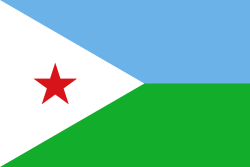Draft:Djibouti War
| Submission declined on 19 October 2024 by Ktkvtsh (talk). This submission's references do not show that the subject qualifies for a Wikipedia article—that is, they do not show significant coverage (not just passing mentions) about the subject in published, reliable, secondary sources that are independent of the subject (see the guidelines on the notability of events). Before any resubmission, additional references meeting these criteria should be added (see technical help and learn about mistakes to avoid when addressing this issue). If no additional references exist, the subject is not suitable for Wikipedia.
Where to get help
How to improve a draft
You can also browse Wikipedia:Featured articles and Wikipedia:Good articles to find examples of Wikipedia's best writing on topics similar to your proposed article. Improving your odds of a speedy review To improve your odds of a faster review, tag your draft with relevant WikiProject tags using the button below. This will let reviewers know a new draft has been submitted in their area of interest. For instance, if you wrote about a female astronomer, you would want to add the Biography, Astronomy, and Women scientists tags. Editor resources
|  |
Djibouti War
[edit]| Djibouti War | |||||||
|---|---|---|---|---|---|---|---|
| Part of Decolonisation of Africa | |||||||
 Flags of Djibouti and the FLCS | |||||||
| |||||||
| Belligerents | |||||||
|
|
| ||||||
| Commanders and leaders | |||||||
|
|
Hassan Gouled Aptidon | ||||||
| Strength | |||||||
|
|
| ||||||
| Casualties and losses | |||||||
|
|
| ||||||
Background
[edit]The Djibouti War refers to the conflict between nationalist forces in Djibouti, primarily the Front for the Liberation of the Somali Coast (FLCS), and French colonial authorities. Djibouti, located at the strategic crossroads of the Red Sea and the Gulf of Aden, was established as a French protectorate in 1884.
The local population faced economic and political challenges under colonial rule, leading to the emergence of nationalist sentiments in the mid-20th century. Post-World War II, various political movements sought independence from colonial powers, inspired by broader trends in Africa toward decolonization.
Rise of Nationalism
[edit]In the 1960s, as anti-colonial movements gained momentum across Africa, the FLCS emerged as a significant force advocating for independence. The FLCS aimed to unify the Somali-speaking population of Djibouti with that of neighboring Somalia.
In 1967, a referendum was held to decide whether the territory would remain a French territory or unite with Somalia. The referendum resulted in a majority vote to remain under French administration, but this outcome heightened tensions and dissatisfaction among nationalist groups.
The Conflict
[edit]From the early 1970s, FLCS militants began to engage in armed resistance against French forces. The conflict escalated with a series of attacks on French military installations, leading to increased military presence by French troops in the region. Notable incidents during the conflict included:
- 1975: Increased guerrilla activities by the FLCS targeting military and logistical assets.
- 1976: French military operations aimed at suppressing FLCS activities led to significant clashes.
- 1977: The conflict culminated in a referendum for independence, amidst growing local support for the FLCS.
Independence
[edit]On June 27, 1977, a referendum resulted in overwhelming support for independence, leading to the establishment of Djibouti as a sovereign nation. Hassan Gouled Aptidon was elected as the first president of the newly independent state. The transition involved addressing various socio-economic issues stemming from colonial rule and establishing a national identity.
Aftermath
[edit]Following independence, Djibouti faced challenges such as economic development and political stability. The government focused on building diplomatic relations with neighboring countries and leveraging Djibouti’s strategic location for international trade and military logistics.
Despite challenges, Djibouti has developed as a significant logistical hub in the region, attracting foreign investments and military presence, particularly from the United States and France. The legacy of the war and the struggle for independence continue to influence Djibouti's political landscape.
References
[edit]
